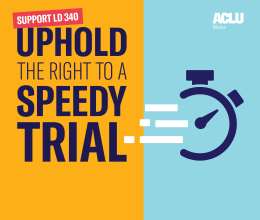The right to counsel and right to the remain silent are essential freedoms that can prevent coercion when a person is accused of a crime or interrogated by police. If a person invokes their right to remain silent or their right to counsel, even ambiguously, police must stop the interrogation.
In the case of State of Maine vs. Derric McLain, Mr. McLain is appealing his criminal conviction. He argues that the court was wrong to deny his motion to suppress statements he made while in police custody. When McLain was brought to jail for questioning, he was read his Miranda rights. When asked by police if he wished to answer questions, McLain asked, “Is there a lawyer here?” The officers responded, “no,” and then proceeded to inappropriately interrogate McLain.
McLain’s lawyers argue that he was invoking his right to counsel by asking if there was a lawyer present, but the officers ignored his request.
History of Miranda Rights
For more than half a century, nearly every American with a television has likely heard the words: “You have the right to remain silent. Anything you say can (and will) be used against you in a court of law. You have the right to the presence of an attorney, and if you cannot afford an attorney, one will be appointed for you prior to any questioning.” This routine statement informs people of their basic rights during an interrogation, namely that they cannot be forced to incriminate themselves. These Miranda warnings, as they are known, were mandated by the U.S. Supreme Court in a 1966 case called Miranda v. Arizona. The case was litigated by the ACLU and formed part of the fabric of law enforcement’s relationship with the public.
When the U.S. Supreme Court decided Miranda, the justices said defendants could assert their right to remain silent and their right to counsel “in any manner.” Since then, however, federal courts have rolled back Miranda protections. In 2022, the U.S. Supreme Court ruled that people cannot sue if they are denied Miranda warnings and then have their statements used against them in a criminal trial, a clear violation of their rights.
Understanding Miranda Rights
Miranda warnings are designed to protect your critical rights in a context that can be inherently coercive: police custody. Police officers are often trained in techniques that teach officers how to “dominate” the interrogation session. Officers also use deceptive tactics that may convince the suspect that they are safe to speak freely and that the police are there “to help.”
The criminal legal system is complex, and interrogations can be particularly stressful. Understanding Miranda rights is crucial for people to protect themselves and to fulfill our Constitution’s unique principle that all people are innocent until proven guilty beyond a reasonable doubt. People unfamiliar with the judicial process may not fully understand the implications of their Miranda rights and what will happen if they choose to waive them. People with cognitive disabilities are particularly vulnerable; in fact, people caught up in the criminal justice system are more likely to have a cognitive disability than the general population. A person’s disability or lack of knowledge of the criminal legal system should never affect their right to a fair trial.
Constitutional rights like Miranda warnings exist to provide balance in a coercive setting so the deck is not stacked against the people or in favor of the state. But these rights are only meaningful if people can exercise them. Miranda rights must be interpreted broadly so people can invoke their rights in a variety of ways. No person should be required to memorize and recite one specific phrase in order to exercise a basic right.
Arguments at Maine’s Highest Court
In September, Maine’s supreme court invited friend-of-the-court briefs in the appeal of State of Maine v. Derric McLain, specifically in relation to how explicitly criminal defendants must assert their Miranda rights.
In our brief, we argued to the Maine Supreme Judicial Court that the state’s constitution provides stronger safeguards than current rulings at the federal level. Police have an obligation to stop interrogations – except to ask clarifying questions about whether the defendant is asserting their rights – even if the defendant is ambiguous in requesting an attorney or invoking their right to remain silent. Broad Miranda protections are essential to deter coercive police questioning, guarantee trustworthy evidence, and safeguard fundamental trial rights.
On Tuesday, December 6, 2022, the ACLU of Maine presented oral arguments to the Maine Supreme Judicial Court. The court has yet to rule on the matter.
Case History
- June 12, 2020: Derric McLain was charged with aggravated trafficking of a scheduled drug.
- February 19, 2021: The court held a hearing on the motion to suppress on the legaility of the June 12 highway stop, and Mr. McLain's waiver of Miranda rights during interrogation.
- April 1, 2021: The court denies the motion to suppress
- June 2-3, 2021: A jury trial was held, during which the state admitted Mr. McLain's statements made during his June 12 interrogation. The jury returned a guilty verdict.
- July 28, 2021: The court sentenced Mr. McLain to 15 years in the Department of Corrections.
- August 5, 2021: A notice of appeal was filed.








